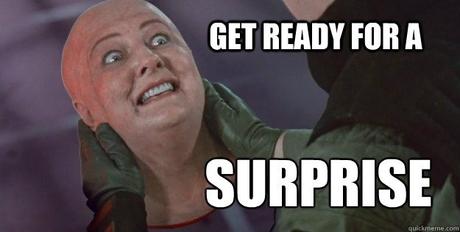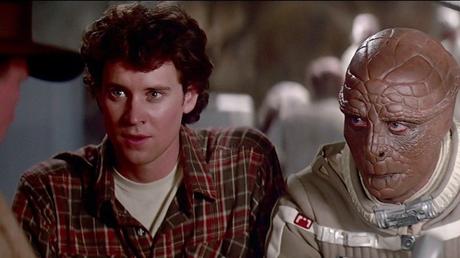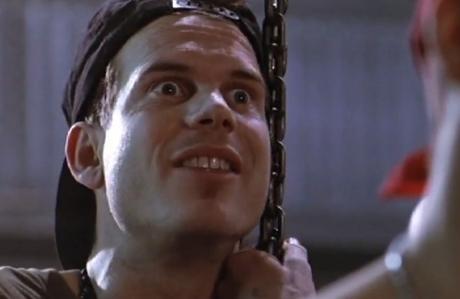Plot: Set in Oregon in Spring 2018, Armada follows the story of eighteen year old Zack Lightman. A fatherless high school student raised by his mother, Zack suffers through the last few months of his “imprisonment” with no real concrete plans. Zack’s only claim to fame is that he’s one of the best players in the world when it comes to the online space shooting game called Armada. Commendable, but hardly practical in the real world. That is until the day a ship ripped from the game itself lands on his high school lawn. Zack is immediately recruited to join the Earth Defense Alliance. Unbeknownst to the rest of the world, the government has been training civilians for years through video games to prepare for a real alien invasion—an invasion that will occur in less than twenty-four hours and could bring about the destruction of the entire human race.

Actually there’s nothing surprising or original about this book.
Review: When Ernest Cline’s fantastic debut novel Ready Player One hit the market four years ago, the ripples across the Nerdverse were like an atom bomb. I personally loved the novel. For those of you unfamiliar with the tale set in 2045, it revolves around a teenager named Wade Watts and his quest to win a highly stylized and complex video game contest inside the OASIS, a virtual reality world created by an eccentric Willy Wonka/Steve Jobs character named James Halliday. The story was a geek’s paradise, as Halliday designed the game around various pop culture aspects he loved including the band Rush, Star Wars, Monty Python, Atari, and a host of others. For God’s sake the book quoted Ghostbusters on the first page! It had me at hello. Even more impressive were the political, social, economic, environmental, and sexual identity issues that were raised in the novel. Cline seamlessly was able to weave all these elements together to form a cohesive book that was simultaneously a joy to read and thought provoking. I’ve read the book four times and it immediately skyrocketed into my top five. Not too shabby for a guy who’s only previous claim to fame was the script for Fanboys which, while decent, didn’t exactly set the world on fire.
My anticipation for his latest novel Armada was through the roof. I mean yes the premise sounded familiar but I was still confident Cline would deliver something special.

“You’ve been recruited by the Frontier to fight Xur and th–I mean by the Earth Defense Alliance to fight the Europans!”
Imagine my surprise however, when Armada turned out to be a tepid, vapid, and tiresome piece of “literature” that I’m surprised even saw the light of day. The dialog is canned, the writing sloppy, and the plot a seeming mish-mash of every science fiction movie ever made. Think The Last Starfighter meets 2010 meets Star Wars meets the video game Halo. Although rather than being a delightful geek flavored ice cream sundae, it’s a self-indulgent saccharine stew. Even the pop-culture references get tiresome. Whereas with Ready Player One they felt relevant, natural, and often hilarious, in Armada they come across as forced, as if Cline is screaming “HEY GET MY COOL REFERENCES DUMB ASS!”
Although Cline’s premise for the novel is intriguing, it’s the execution that’s poor. All writers have been influenced by the authors that came before them. George R.R. Martin was influenced by Tolkien, Stephen King was influenced by Lovecraft, and Tom Clancy was influenced by Tom Le Carre. The same holds true for painters, musicians, and filmmakers. However (and I hate to keep coming back to it) whereas Ready Player One clearly demonstrated and played up the many geek aspects that influenced Cline, Armada feels like the material wasn’t just sampled but stolen.
Look at the main character. Zack possesses the same surname as Daniel Lightman, the character Matthew Broderick portrayed in 1983’s WarGames. Both also live in the Pacific Northwest and have excellent computer skills but are poor in other aspects of school. Then there’s also the fact that the book (with a few minor changes) follows the plot of The Last Starfighter quite a bit. Except instead of The Rylan Star-League it’s the Earth Defense Alliance and except for the Ko-Dan Armada (!) it’s the invading Europans.
Ah yes, the Europans. This is a reference to Europa, Jupiter’s moon and a place long suspected by scientists to have life beneath the surface. Does this ring a bell for any of you right now? Perhaps you’re thinking of 1984’s 2010? That’s not an accident. In Armada it’s explained that we first discovered evidence of life on Europa when a probe showed pictures of a swastika on the surface. Again this is something lifted directly from 1997’s Contact. Meanwhile the ships Zack and company fly seem an amalgamation of the X-Wings from Star Wars and the Vipers from Battlestar Galactica, while the robomechs from Armada’s corresponding video game Terra Firma are ripped right out of the video game Titanfall.

“Something’s going to happen–something unoriginal.”
All of this is just a roundabout way of saying that nothing about this novel feels particularly original. What’s monumentally insulting to the reader’s intelligence is that Cline sets Armada up so that it looks like all of the science-fiction novels or movies created since the 1970s were a direct result of the threat of invasion from the Europans. That way when the real life battle begins and the technology and situations involved come right out of Flight of the Navigator or something similar, it makes a weird kind of logic. However, it’s actually a not so well hidden means for Cline to justify ripping off virtually every science fiction film, movie, and videogame since 1977 and putting it in Armada. It’s incredibly self-serving and anyone with a modicum of intelligence will be able to see right through it.
As if the plot, terrible dialog (“How do I get out of this chickenshit outfit?!”), and plagiarism weren’t bad enough, the reader is forced to deal with some pretty one dimensional characters. Zack’s Mom is given short shrift despite being a hardworking nurse who’s raised a son on her own since Zack’s father passed. His two best friends just seem along for the ride, and he works for a guy that is essentially the Armada equivalent of Comic-book Guy from The Simpsons. Then there’s Zack’s love interest Lex—just ugggh. All we really know is that she’s a steampunk chick who has a Tank Girl tattoo, is super-hot, and who (big shocker!) is in to everything that Zack is. Essentially this is a fifteen year old geek’s nocturnal emission. It’s not only a sad and stereotypical admonishment of geek culture, it paints geeks—particularly male geeks—in a very poor light. It’s like saying hey “80s movies like Revenge of the Nerds promised I’d get the hot chick so I’m entitled to it!” All this does is reinforces the typical geek stereotype. Not only is it a stereotypical depiction of the majority of game/geek culture, it’s dangerous. It’s this self-entitled mentality that leads to stuff like Gamergate. Mr. Cline should know better.

“How do I get out of this chickenshit book?”
Despite the fact that I’ve trashed this novel for the last 1,000 words or so, Armada isn’t all bad. It’s surprisingly readable, despite all of its glaring flaws. The space battles Cline describes are pitch perfect. I also enjoyed how Zack got a glimpse into his father’s life through an old trunk filled with music, movies, and journals. I even kind of liked the ending even though it was cliché and predictable.
Perhaps after such a momentous debut with Ready Player One, a sophomore slump was inevitable for Ernest Cline. Yet even so, I did not expect such a dramatic downturn. It should be pointed out that Cline sold the film rights to this book for seven figures before even one word was written. It’s not surprising then that the book feels like a cash grab. And though Armada was sometimes entertaining, it certainly wasn’t the sumptuous feast that Ready Player One was. Cline’s debut novel was a magnificently prepared steak dinner that you remember for the rest of your life. Armada however is cotton candy. It tastes sweet but soon dissolves and is quickly forgotten.
My rating: 3/10
Follow me, Darth Gandalf, on Twitter @cocook1978.

